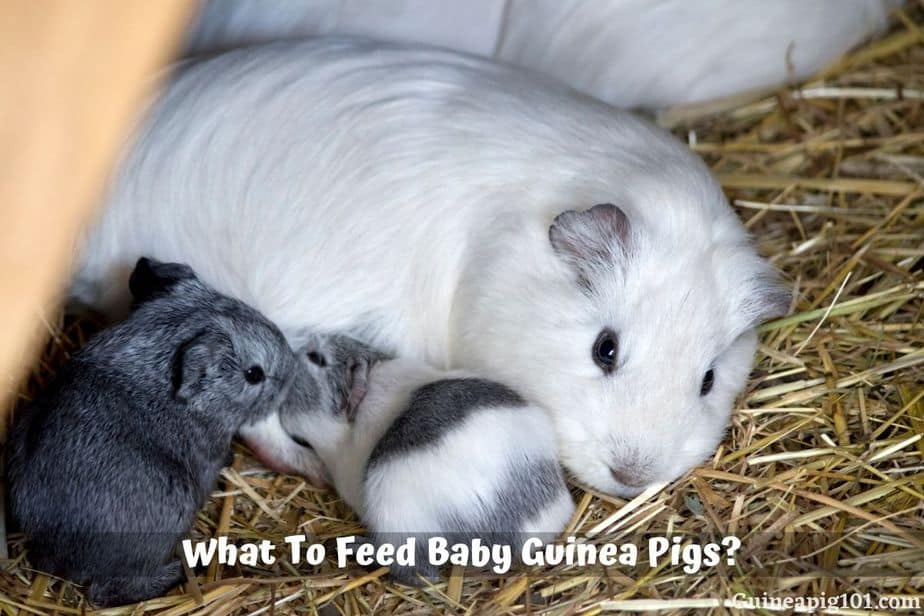The first six months of your guinea pig’s life is crucial for their longterm health. In this primary stage of their growth, a guinea pig undergoes some physical changes continuously. Their diet plan must consider their growth. But what can we feed baby guinea pigs? Can they eat veggies, pellets, or do they have special dietary requirements?
Fresh hay and water are essential foods in those early days. Baby guinea pigs require high protein, thus offer them pellets and dry alfalfa grass. Your baby guinea pigs will stop drinking mother’s milk once they are three weeks old. You can consider adding a small serving of fresh veggies at this stage.
You must ensure that your baby guinea pigs are getting enough nourishment, so they develop healthy bones and muscles as they grow older.
Be confident that your baby guinea pigs get into good eating habits. It’s tempting to feed some excess food to young guinea pigs, but it can result in obesity and health problems later in life.
They will need more fiber than protein as they grow older, and their growth rate slows down. This guide will explain to you what is the best diet plan for your baby guinea pigs. So, read it till the end to learn all about it.
What do baby guinea pigs eat?
People who are new to keeping guinea pigs get surprised to know what they eat. Excess sweet veggies like carrots or iceberg lettuce will lead to health problems. Instead of this, your guinea pigs mostly survive on eating dry grass.
By providing hay as a major part of their diet, the idea is to replicate what they would eat in the wild otherwise.
Offering fresh grass to pet guinea pigs as the staple is not possible. Hay (dry grass) is a replacement for grass. Your guinea pigs can munch on it all day.
Including dry grass, guinea pigs find pleasure in eating fresh fruits and vegetables and fancy pellets. These foods must be given to them in small quantities, as too many vegetables can upset their stomach.
Pellets are not compulsory for guinea pigs once they reach adulthood. These are crucial for baby and young guinea pigs, as pellets are rich in some vitamins and minerals that are needed more at an early age than in later age.
They also contain lots of calories. Thus, as guinea pigs get older, the proportion of pellets must be decreased from their diet. Do not worry if your guinea pigs refuse eating pellets.
Drinking water is also vital for guinea pigs. They must be able to drink fresh water quickly, provide them clean water in a bowl, or attach a bottle to their cage.
Guinea pig diet basics
The three main foods of guinea pig’s diet are pellets, hay, and fresh vegetables. If we get to draw a chart of guinea pig’s diet, then hay would be written as the most important part followed by vegetables and pellets.
That is because the digestive passage of guinea pigs is designed to absorb fiber found in dry grass. There are kinds of hay available, each carrying a different quality:
- Grass hay ( meadow hay or timothy hay): This is excellent hay feed to guinea pigs by their owners. This hay is fresh grass, which is dried out after cutting. That means that non-domesticated guinea pigs eat this grass.
- Oat grass: This grass is made by oat grass, which is cropped before it grows. Once the oat cultivates, this hay then does not carry any nutrients for guinea pigs. However, it can be used to make their bed.
- Alfalfa grass: This is quite different than usual hay; it is more legume than grass. Alfalfa hay is usually offered to young guinea pigs. It carries more protein and calcium than any other hay, so it helps to gain weight and develop bones and muscles.
Also read: All about types of hay, its important and more
Pellets are said to be an essential part of the diet of guinea pigs. However, many researchers state that pellets are not necessary for adult guinea pigs, as the growth rate is slacked, and their bodies do not need excess minerals.
If your guinea pigs seem overweight, then you should remove pellets from their diet. Adult guinea pigs can survive eating hay and vegetables only. However, pellets are necessary for young and baby guinea pigs to grow.
Treats should be offered to them occasionally only, specifically fruits. Guinea pigs love the sweet taste, so they enjoy berries, raisins, beetroot, and carrots. But, their body is not made to process complex carbohydrates.
Guinea pigs can enjoy a spoon of fresh fruit for every 2lbs of their body weight.
Once more, guinea pigs who are overweight should not be given fresh fruit and treat for some time.
Guinea pigs do not compulsorily need these foods to grow. They will get all the essential vitamins they need from hay and vegetables only.
Also read:
Baby guinea pig food guide
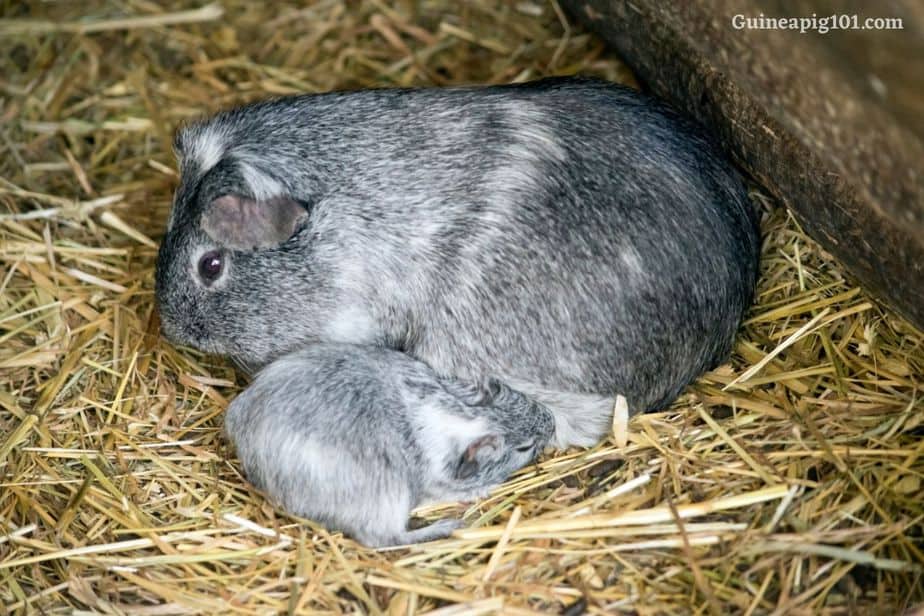
Your guinea pigs need more food to eat, as they are continually growing. Baby guinea pigs need food to stay warm after their fur sheds for the first time.
The diet of baby guinea pigs regularly adjusts as they grow. At around two weeks, they will eat solid grass.
But, this will be offered to them, including their mother’s milk. At the time of reaching four weeks, baby guinea pigs start eating hay and pellets.
Let baby guinea pigs eat alfalfa hay. The protein and calcium found in this hay will help them grow strong muscles and bones.
But, mix some standard timothy hay in it too. That will make the transformation easier when your guinea pigs become adults.
Keep this in mind that the kind of pellets your guinea pigs are eating are specially made for young guinea pigs. That will supply everything your guinea pigs need to grow.
Keep it appropriate, whatever you are giving to eat to your piggies. Guinea pigs are sensitive to change, especially younger ones. So do not keep changing their food until and unless it is needed.
Also read:
Baby guinea pig food list
The first thing to do before you bring your guinea pigs home is to make a shopping list. For guinea pigs, healthy food is essential, so it is better to estimate what is best before they arrive.
You are supposed to purchase hay in advance. Alfalfa hay is considered most essential but brings some traditional meadow hay too. Do not let your guinea pigs attach to the taste of alfalfa hay because they are not going to eat only this for life.
Do not purchase a huge bag of pellets. However, you will be informed that baby guinea pigs eat lots of pellets. Pellets can get fungal growth very quickly, so smaller bags of pellets are correct.
Can baby guinea pigs eat hay

Alfalfa hay is best possible for baby guinea pigs. In the first month of their birth, guinea pigs will gain proteins by this hay. Pellets also carry alfalfa, so your guinea pigs will be in good health.
Even if alfalfa hay is correct for baby guinea pigs, they should not be eating this exclusively.
There should be a ratio of 3:2, which is mixing alfalfa hay with traditional timothy hay. This will help you to ease the transition of your guinea pigs to timothy hay as they grow up.
Other than this, be sure that the cage of your guinea pigs is full of hay. They will sleep on hay, and generally, they will be surrounded by this. It also means that they will eliminate a lot of waste in their hay.
As the brains and bladders of baby guinea pigs are not mature enough. They will take some time to be litter trained.
You need to be careful though as molds can be formed by urine on hay, and it is harmful to guinea pigs. Keep cleaning their cage regularly.
Hay must appear as a source of enjoyment to your baby guinea pigs. Put your guinea pigs quickly in the habit of eating hay. Include this habit while they play or do exercise as well.
Can baby guinea pigs eat vegetables
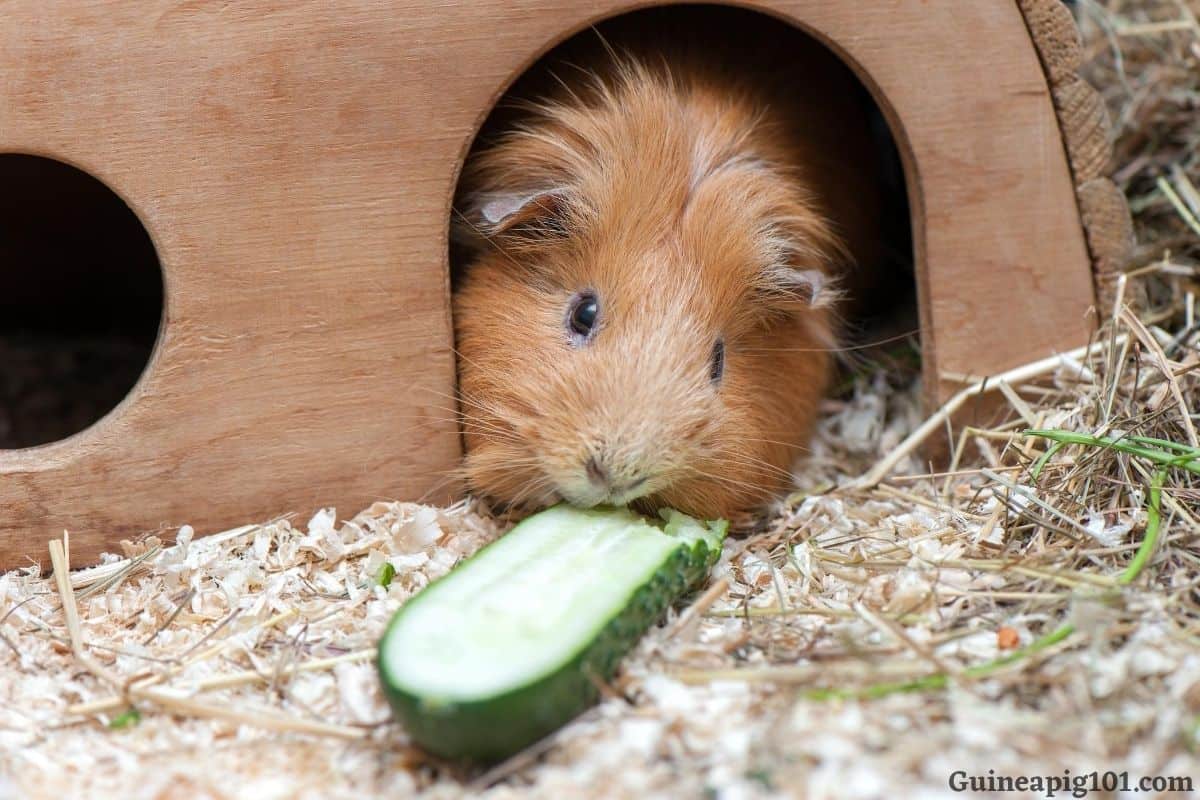
As baby guinea pigs having a soft digestive passage, many people beleive that they should not eat fresh foods like fruits and vegetables.
However, The fact is that fresh food and vegetables are good for them if served in moderation.
Because of the lack of information, the statement that baby guinea pigs eating fresh food is harmful has appeared.
It is true that offering fresh vegetables, which is not correct for the age of guinea pigs results in danger. Guinea pigs take a while to adapt changes in diet.
However, make sure to avoid watery veggies like cucumber, zucchini, etc when you have just started serving vegetables. Begin with bell peppers, cilantro, lettuce, and slowly transition to other veggies.
Baby guinea pigs can munch on vegetables when they reach 4 weeks old, and their stomach gets stable enough to digest vegetables in small amounts.
Fresh vegetables will also control the size of their teeth as their teeth keep growing. Their teeth will get shaped when they eat solid foods.
Fruits must be offered to guinea pigs only for treats or for training. When your guinea pigs start eating the correct amount of hay, you can offer them fruits as candy.
Can baby guinea pigs eat pellets
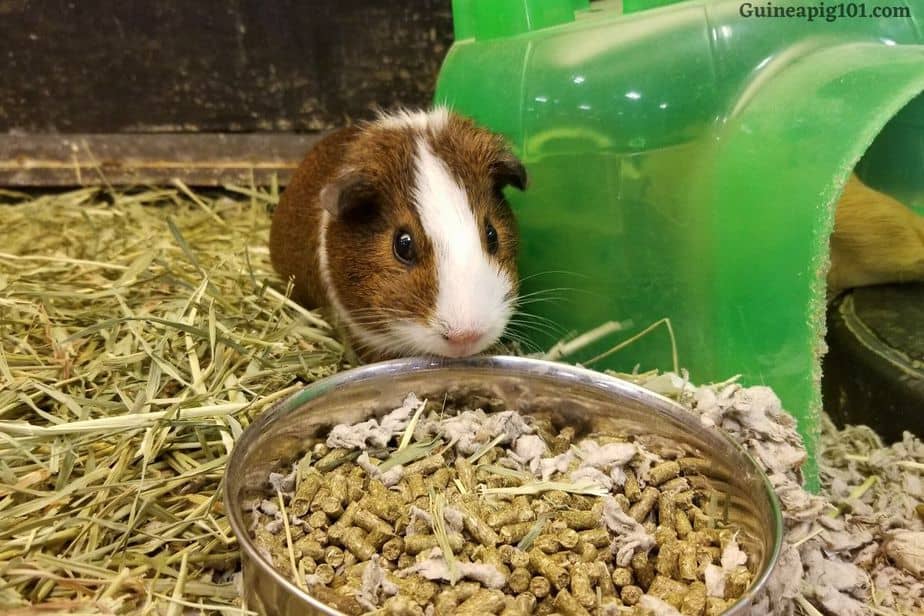
Pellets are recommended to be included in your baby guinea pig’s diet schedule. Your guinea pigs will rise joyfully and fit. But the amount and the kind of pellets should be correct.
Be careful as some pet stores suggest that baby guinea pigs can eat lots of pellets; theoretically, it is right. Young guinea pigs can handle the calories they get because of their continually growing body.
However, your guinea pigs are learning negative habits from this at the same time.
Regularly eating pellets may get your guinea pigs accustomed to it, and if you try to stop them eating pellets when they reach adulthood, they will feel upset.
Hence, learning how to rely on hay at an early age is better for your guinea pig’s health.
Keep this in mind to buy the best possible right kind of pellets containing 22% of the fiber, 14% of proteins, and not more than 1% of calcium. Anything high in calcium can be bad for their health.
Avoid attracting pellets that contain a mixture of cereals. However, they will enjoy the taste of nuts and seeds in it.
As baby guinea pigs are immature, they will enjoy eating food that lacks nutrients but are tasty and refuses to notice other foods.
Can baby guinea pigs drink from a water bottle
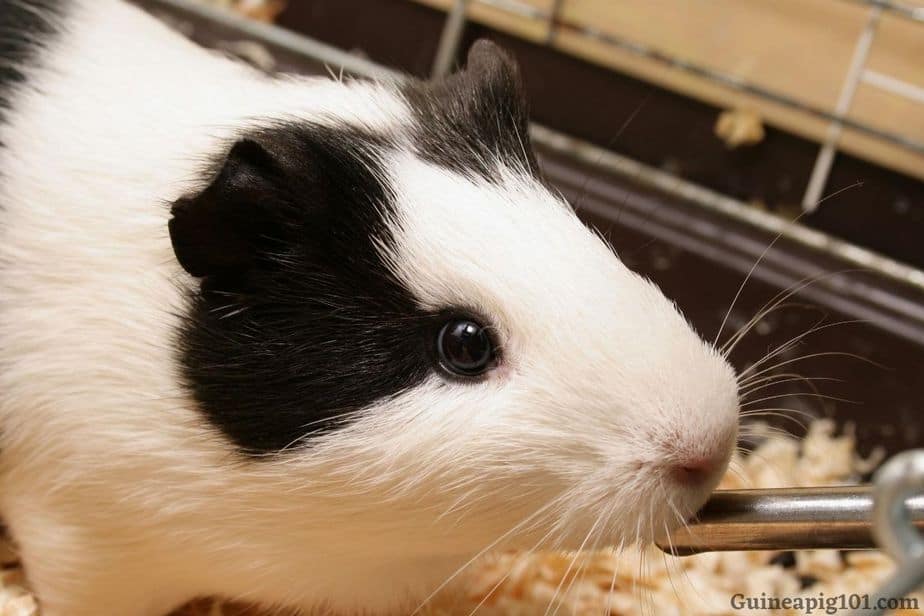
Baby guinea pigs can consume water from a bottle as her mother will teach them how to do so on an early stage.
Until baby guinea pigs turn 3 weeks old, they get hydration from their mothers. As they grow, baby guinea pigs need to drink more water as they eat lots of solid food. So drinking water becomes essential for them to be healthy.
However, not all guinea pigs are able to drink from bottle at such an early age.
Knowing how baby guinea pigs enjoy drinking water is essential. Many of them enjoy drinking water from a bottle. And many drinks from a bowl.
In whatever way your pets are enjoying drinking water, just encourage them to drink more.
Baby guinea pigs are always playing and impatient, so if you offer them to drink from a bowl, it should not be light in weight, and it must have a little depth.
It happens that they start playing in and from water, which can grow mold on hay, and guinea pigs may also suffer from low body temperature as they get wet and their body loses heat.
Can baby guinea pigs drink cow milk
Guinea pigs are weaned when they are three weeks old. Until then, mother guinea pigs will feed them milk and teach them to transition to solid food.
Mothers should not be kept far from their baby guinea pigs until they start eating solid food. If the owner of a local pet shop gives you smaller than four weeks old guinea pigs, do not get them home.
If the mother guinea pig is not feeding their babies and you need to provide them with milk then avoid cow milk because it contains lots of calcium. You can offer them goat milk or kitten milk, which is acceptable.
However, kitten milk carries fewer calories than guinea pig’s milk. In response to this, mix sugarless cream in it and offer them multiple times in a day.
Also, don’t rely only on milk for their nutritional needs. After turning two weeks old, baby guinea pigs will require some solid food and water. Ignoring these supplies will leave guinea pigs malnourished.
Baby guinea pig healthy diet
Baby guinea pigs will feel energetic at times, but they will require constant short naps. Due to the lack of a proper diet, you may find your guinea pigs lazier than normal.
Observing a guinea pig’s poop discharge is a way to know about their health conditions and especially their digestive system.
Baby guinea pigs remove two kinds of wastes:
- Pellet waste that always remains there in their cage.
- Cecotropes, that is a nutritious soft poop that guinea pigs will eat.
A healthy poop discharge of guinea pigs will be light brown, and when you pick it up for cleaning, it will break down.
It shows that your guinea pigs are consuming a lot of protein when their poop appears dark in color.
Baby guinea pigs who suffer from loose motions need urgent medical treatments. This illness can be dangerous over time.
Baby guinea pig eating too fast
It is normal for baby guinea pigs to eat too fast or too slow. Sometimes it can lead to hiccups, but these are nothing to be worried about, as in most cases, hiccups disappear within a short span of time.
Baby guinea pigs feel insecure about their food which is the actual reason why they eat fast.
Only after being kept on a tight schedule, they will know when they will get the food which calms them down and fixes this issue.
Eating food fast is also done by guinea pigs who live together in a large cage with lots of other guinea pigs. Guinea pigs will be worried that another will eat their food so they try to munch on it rather quickly.
Baby guinea pig not eating

It becomes essential to know why your guinea pigs are not eating. When any guinea pigs of any age refuse to eat, that becomes a headache. And if the guinea pigs are young and do not eat, then the trouble doubles.
When adult guinea pigs eat less food then you are not much stressed because they do not require high calories. They might prefer eating fewer pellets and more hay. However, if young one refuses to eat, it might be a trouble.
You must keep this in check that your pets can accept change in their diet. It is not right that they hold on to one of their favorites when you change their diet program. If so, then it must be taken care of.
Undoubtedly, baby guinea pigs require more food to eat, but if you’re filling their stomach with too much food of their choice, you are setting a bad example. Turning to adults, they will disagree with eating anything that they do not prefer.
Sometimes baby guinea pigs might not eat normally when they are separated from their mother. You need to make sure that your guinea pigs are not stressed as they are being held far from their siblings and mothers.
Sometimes neutering/spaying of young guinea pigs can also bring changes in behavior. It may happen that they do not feel hungry for some time, but it should be managed quickly. You may need to reach out to your vet if such a situation arises.
Also read: Gastrointestinal stasis in guinea pigs
Alternative food for baby guinea pigs
You must provide some drinks if your guinea pigs are not eating. This statement seems easy to say but hard to apply. Consult a professional vet to be sure about the nourishment need of your guinea pigs.
If you can’t find the milk that is only for guinea pigs, you can provide them with a goat or kitten milk.
Your guinea pigs will need more milk if they refuse to eat hay or pellets.
- 1-2 weeks old- 10-15 ml
- 2-3 weeks old- 15-30 ml
- 3-8 weeks old- 30 ml+
You can feed milk to your guinea pigs with the help of a syringe. But, some baby guinea pigs will refuse to drink milk from it. You can get a bottle for small pets as well.
However, it is just a temporary solution, and you must find out why your pets are not eating and solve the issue.
Feeding baby guinea pigs is similar to providing nourishment to older guinea pigs. Young Guinea pigs need lots of food and prefer more pellets to eat.
Putting your guinea pigs in good habits of eating healthy food is very important. What they learn at a young age will directly impact their diet as they grow older.
Source: Anaphylactic sensitivity of guinea-pigs drinking different preparations of cows’ milk and infant formulae, Social attachment of the infant guinea pig to its parents, A healthy diet for guinea pigs, Guinea pigs diet
